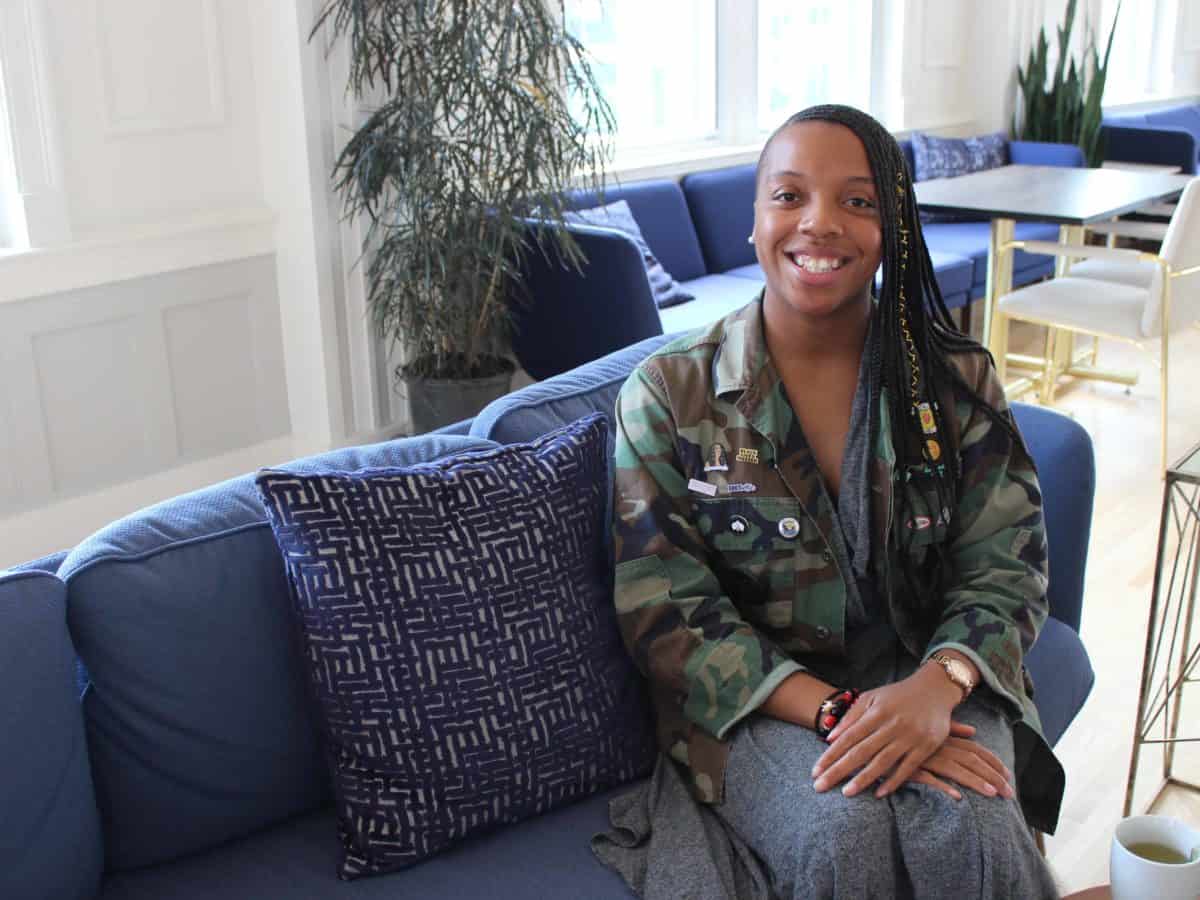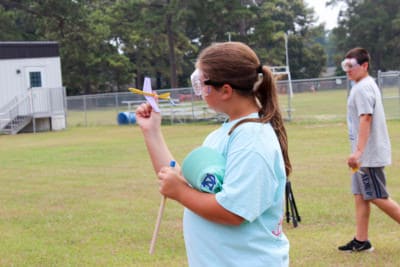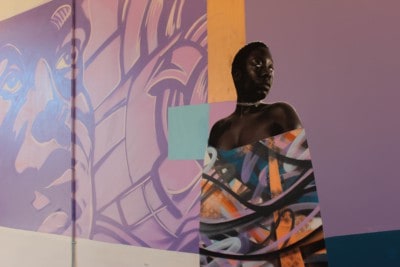
Malliron Hodge, a native of Bunn, North Carolina, spent the past seven years working in education in New Orleans. Along the way, she learned to dig deep into communities for answers to their educational needs. Upon her recent return to North Carolina in April, Hodge is especially interested in facilitating discussions around creative ideas and problem-solving for rural schools. She also recently led a workshop at Teach for America’s PACE Summit titled “Designing with Equity in Mind.”
Below is a Q&A with Hodge, edited for clarity.
Bendaas: How did your work in education bring you back to North Carolina?
Hodge: I started with 4.0 Schools, which is an education nonprofit based in New Orleans. We work with people who have early-stage education ideas, whether that’s a program or service, a school (if someone wants to start a microschool, or a home school, or a community school), [or] a physical product, like a toy for children. . .
When I started there my role was—well, I was doing Startup Weekends—and then New Orleans Community Manager. So that was just working with people in New Orleans who had ideas. As I was doing this work and I would talk to friends that were educators here in North Carolina, they were like, ‘Oh this is really cool. I wish we had something like that here,’ or ‘I’ve never heard about that.’ So I always had this desire to come back to North Carolina, but wanted to make sure it was the right move for me and also that I could fit into the space.
I just happened to talk to one of my best friends who is a principal in an elementary school in Franklin County and I said, ‘Hey, I would love to partner with you and do a workshop for educators.’ Essentially, we brought together maybe about 10 educators who had ideas, or there were problems and things that their students were facing, and they wanted to think of creative ways to solve those problems. We did the first event in July, and then after that I felt like there were more educators in rural spaces that I could work with. I essentially proposed that to my boss: I was like, ‘Hey, I want to quit my job, and I want to do this!’
So I did another iteration of that in January, and coming up are two more events: one in Rocky Mount and one in Charlotte—which isn’t rural, but we’re going to be marketing to rural communities outside of Charlotte. The hope is to bring together people in rural communities who have ideas, or [to see] if there are opportunities or problems that they have been working on or thinking about but just haven’t had the space and community to be able to think about innovative ways to solve these problems. The goal is, if they want to, they can continue on with 4.0 programming, but if not, I still want to be there to coach them and help them get their ideas off the ground.
Bendaas: Since you held the events in North Carolina last July and in January, what are some of the problems that you heard?
Hodge: In July, the team that won, which was voted on by the other teachers, was boys in middle school wanting to have extracurricular activities outside of sports—just a place for them to be mentored and learn more about the community and also be engaged. And so it was a group of five educators that started Boys to Men. It’s essentially a group of boys that come together. I think they meet once a week, and they have a speaker from the community—it could be a pastor, a leader in the community—but they just kind of share and have boy talk.
In January, we did more of people co-working together. Another idea that came out of that was a resource center for the community. So, this is in Franklin County. One of the educators at Louisburg High School, he [said] ‘I really want to create this space for my students to be able to see the resources outside of school, whether that’s after school or on the weekend.’ He’s hoping to create a resource center, whether that’s they have laptops and Wifi available, or they have books, or just a space for them to engage. And there was another educator who is interested in creating a professional development program for educators across the region, instead of just a standard one that’s normally specific to each school.
So those are some of the ideas that have surfaced. It’s been really cool because I’ve just facilitated and just pushed people on it, but they have really worked in teams to surface those ideas.
Bendaas: Why do you think it’s so important for rural schools to be having these kinds of conversations?
Hodge: I think there are a lot of ideas that educators have, and also people in the community have, so while I’m focused on educators, if there’s someone in the community who has an idea, I’m totally open to them attending as well. But I feel like there are a lot of ideas that are floating out there, and sometimes it seems as though [people] don’t realize that there are resources and there are connections and a community of people who want to help solve these problems, or think about creative solutions to these problems.
Being able to bring those resources that are normally in urban settings, or maybe in some rural settings—just letting them know there’s someone out here to help you and to coach you and be that support. Also, there are other people in your school and across the county who have ideas as well.
Bendaas: What are some of the challenges that you’ve experienced doing work in a rural area compared to an urban area like New Orleans?
Hodge: The biggest thing is proximity. There’s a lot of distance.
I grew up in Bunn, North Carolina, so I’m familiar with ‘We have to drive 30 minutes to get to Raleigh, which is where all the fun stuff is at.’ And there’ll still be stuff to do in the country, but it’s just different . . . as compared to being in an urban setting.
So that would be the big thing. And then sometimes kind of being in this mindset of it being challenging to push the limits of creativity . . . ‘I know we can’t do that because we don’t have funds allocated for this, this, and this’—just thinking outside the box and thinking creatively. Those would be two things that have been challenges, and so I’ve kind of leaned into those and say ‘I’m here to support you. Also there’s resources out here.’
Bendaas: I think I want to know a little bit more about you—so a little bit more about how you got into education or why you’re interested in the field?
Hodge: When I first moved to New Orleans in 2011, I was an AmeriCorps VISTA and I worked at a charter school. If you don’t know anything about education in New Orleans, it’s a lot to unpack . . . but within my role as an AmeriCorps Vista, I was a Community Partnership Coordinator at ARISE Academy. My major role was going out into the community and letting them know about ARISE because it was two years old. It was a charter that was taking over a public school that had been there . . . and they initially started as K-2 and they were expanding each year, so gaining a grade per year until they got up to pre-K through 8. So I spent a lot of time going out into the community talking to parents, trying to figure out ‘okay, here’s the school. What can make the school better?’ What did you need as a resource as parents? And I helped to start the parent-teacher organization there at the school.
There was a local farmers market that had been meeting on the grounds of a church down the street, so I was able to meet with them and partner them with the school. . . . On Saturdays, they would come during the parent-teacher organization meetings and do cooking demonstrations. We did a trunk-or-treat. So a big piece is figuring out how to get more of the community, specifically the parents, engaged in a way that they wanted to be engaged instead of . . . ‘we want them to show up for this thing and then go home.’ Instead [they could say], ‘I want to volunteer in the classroom,’ ‘I want to go on these field trips’ . . .
So that was my introduction to education, and specifically education in New Orleans. And being in that space and unpacking a lot of the things that were going on after Katrina, I was really, really passionate about education.
After that, I went on to work at a culinary job training program called Cafe Reconcile, and then I worked at Tulane as an assistant director for student leadership and development—so kind of dabbled in nonprofit then higher ed and then went back to the space of nonprofit and worked at 4.0.
4.0 has been exciting for me because I’m able to take the things that I learned at ARISE . . . but also to work with people who have ideas who want to challenge the norm of thinking about how to make the future of school better. That’s what I really like. I like thinking about how to put students at the center and allow them a voice. But also if parents want to do something, if people in the community [want to do something]—we’re all actively engaging and thinking about how to make the future of school better.
Bendaas: Why is it so important to view a school as a community?
Hodge: That’s what I am excited about in rural communities. It’s because the school is tucked into a community, so there are people that are supporting it, whether it’s Boosters, or the athletic department, or Beta Club, or debate team. Within that school, there are communities of people—there’s different parents, there’s different families—that are all coming together to support children, enriching their lives, and being great citizens. . . I just think it all blends together because it takes a village to raise children. I think people need to think about—within that school—that’s that village of people coming together to make school even better.
Bendaas: What are you most excited about for North Carolina now that you’re here? Why North Carolina?
Hodge: I am excited to just be home. It’s good to be home. It’s interesting because I’m from Bunn, but I am living in [the] Chapel Hill/Durham area, because I’m passionate about rural communities but also I think Durham and Chapel Hill and the different counties have been doing some really interesting things. I’m excited to be back in the Triangle and learn . . . how things have changed since I was a student because the last time I was here, I was a student in high school. So that was like 12 years ago. (I went to Bunn Elementary, Bunn Middle, and Bunn High School.)
I’m just excited to back and to be this resource for people that have ideas. Sometimes I find that people may not know that it’s an idea—it’s ‘I have been struggling with this thing, and I need to talk to somebody about it,’ and being that person [to say]: ‘Hey, let’s talk about it . . . Do you realize this could be an idea. Let’s work together!’ Just bringing back all of this knowledge I have gained and figuring out how to best be a part of the community, but not feeling like I know everything and I need to share it with you. [It’s more of], we are working together on this.
Bendaas: Is there anything at all that you wanted to add, if you had the opportunity to say something I didn’t ask?
Hodge: Well the interesting thing is I play roller derby, so that’s fun. I’m going to be with the Carolina Rollergirls. They’re out of Apex.
That’s just the fun carrot.
Recommended reading



